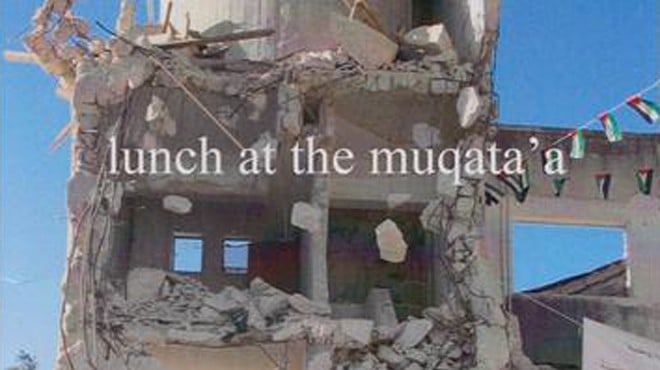
An important step towards calling attention to the indefensible silence in the American literary scene on the state of Israel

I have often decried wherever I can in my writing the lack of moral and political commitment among American authors, primarily those dealing with literature, when it comes to the enslaving of Palestinians by the state of Israel. For that purpose alone F. S. Rosa’s Lunch at the Muqata’a is an important step towards calling attention to the indefensible silence in the American literary scene. It is a work of literary non-fiction, a slim volume, a recollection of Rosa’s visit to the West Bank in 2003 that packs a punch.
It has one notable distinction; it’s not vitriolic in its tone. The narrative tries its best to humanise the other, in this case the occupier, the oppressor. She went there as a member of the International Solidarity Movement (ISM) to observe the continuous effects of occupation and displacement and in her author’s note she admits to sprinkling her subjective opinions "liberally throughout".
She and her companions, who experienced the daily humiliation the Palestinians have been living with, were there to serve two purposes: to help local farmers with their harvests; and deter Israeli invasion, even the killing of an ailing Yasser Arafat as the IDF encircled his battered compound with tanks.
The book is divided into two parts. The first part, the shorter one, is titled Jayyous Quartet and is barely ten pages long. This part shows her interaction with ordinary people of Jayyous whom she had been assigned to help pick olives. In a very small space, Rosa manages to allocate adequate human face and dignity to the Palestinians as extremely resilient and hospitable people, and humanity to a downright colonist from Brooklyn.
In one of the bitter-sweet anecdotes of her stay she describes an interaction that’s worth sharing here. After finding a teller machine on the East Jerusalem side out of order for two days in a row, Rosa decides to use an ATM machine in the Jewish Quarter when a man yells to inform her she’s not welcome on this side. This sends a chill up her spine, thinking the man might have known about her links with the Palestinians. As the comedy unfolded it turns out Rosa is wearing a San Francisco Giants cap. The man is a fan of the Dodgers. The tension breaks down as both start talking about baseball. Half the neighbourhood, it is alleged, once lived in Brooklyn.
"BEAT L.A.," I say with conviction.
He bursts out laughing and his whole face changes. The years fell away and for a moment, spaniel eyes, he looks twenty years younger -- but quickly recovers.
"Los Angeles," he hisses with contempt. "They never should have left Brooklyn."
I don’t say the obvious -- You never should have either.
The second part lends its title to the book and starts with a suicide bombing in the fall of 2003. Israeli and Palestinian activists felt that this would give the Israelis a pretext to invade West Bank and perhaps even kill Yasser Arafat whom they might have managed to poison anyway. This is also discussed in the book, as the second section in fact opens with Surha Arafat calling for exhumation of her husband’s body. Lawyer and activist Huwaida Arraf, co-founder of ISM and married to another activist Adam Shapiro, asks international peace activists if they’d rather go to Ramallah, the headquarters of the Palestinian National Authority as a deterrent, since the Israelis might try to finish off what they couldn’t during last year’s siege.
It was rumoured that the suicide bomber woman had used shrapnel taken from her brother’s and cousin’s bodies. Also when she was twenty one, her fiancé too was killed by the Israeli military. Arafat denounced the suicide bombing. The hundred pages of this section really sum up the lives of Palestinians for so many decades, living under relentless siege, arbitrary killings, checkpoints where one is made to wait for several hours on the whim of a teenage buffoon.
Rosa’s remarkable quality as a writer is not only her political awareness but her humility, which allows other characters as well to lend witness. In a telling scene one of the ISM member pointed to Rosa that the Israeli soldier at the checkpoint yelling the most, appearing more menacing, was not white, and upon further inspection it appeared his gun also didn’t have bullets as compared to those with white skin.
Present at the Muqata’a, as human shields, were Uri and Rachel Avnery, an Italian priest, a Canadian, an American Indians, a British, a team of American jugglers, members of the Jewish Voice for Peace and members of the Gush Shalom.
Rosa is not only a politically alive writer. She is also very well-educated and most informed. In such a small space and a very unassuming voice she lays bare the machinations of a racist state, touches on internal tension within Palestinian National Authority and the society, and laments Canadian and US labours’ heavy investment in Israel Bonds, which exposes the larger hypocrisy that’s eating the US left from within. Those who dare to write against Israeli oppression do so at a grave risk of being blacklisted by mainstream publishers, bookstores and even libraries, not to mention the ostracisation by colleagues and friends. (This is something I attest to from personal experience.)
Books such as Rosa’s may never get reviewed in the US mainstream newspapers and magazines. But just like the Anti-apartheid Movement of South Africa and the Civil Rights Movement in America, initial daring steps have to taken by those with a moral vision. Following in the footsteps of the great Rosa Parks, may F. S. Rosa’s Lunch at the Muqata’a stir the conscience of the American literary circle.
Author: F. S. Rosa
Publisher: Ithuriel’s Spear, 2014
Pages: 131
Price: $16